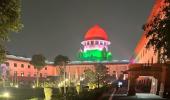President Droupadi Murmu has exercised powers under Article 143(1) used in rarity to know from the Supreme Court whether timelines could be imposed by judicial orders for exercise of discretion by President while dealing with the bills passed by state assemblies.

Article 143 (1) of the Constitution deals with the power of President to consult the Supreme Court "if at any time it appears to the President that a question of law or fact has arisen, or is likely to arise, which is of such a nature and of such public importance that it is expedient to obtain the opinion of the Supreme Court upon it, he may refer the question to that Court for consideration and the Court may, after such hearing as it thinks fit, report to the President its opinion thereon".
President's decision comes in light of the April 8 verdict of the apex court passed in a matter over the powers of Governor in dealing with bills questioned by the Tamil Nadu government.
The April 8 verdict for the first time prescribed President should decide on the bills reserved for her consideration by Governor within three months from the date on which such reference is received.
In a five-page reference, President Murmu posed 14 questions to the Supreme Court and sought to know its opinion on powers of Governor, President under Article 200 and 201 in dealing with bills passed by the state legislature.
Article 200 deals with situations with regard to passage of bills by the state assembly and subsequent options available to the governor on grant of assent, or withholding of assent or sending the bill to President for reconsideration.
Article 201 deals with the bills reserved for the President's consideration by Governor.
The Centre has resorted to the presidential reference instead of seeking review of the verdict, which has evoked sharp reactions in the political spectrum.
The rules prescribe for the review petitions to be heard by the same set of judges in the apex court in chambers while presidential references are heard and considered by a five-judge Constitution bench.
The apex court, however, may choose to refuse to answer any or all of the questions raised in the reference.
Article 200, the reference underlined, which prescribes powers of Governor to be followed while assenting to bills, withholding assent to bills and reserving a bill for President's consideration, does not stipulate any time frame upon Governor for the exercise of constitutional options.
President said similarly Article 201 which prescribes the powers of President and the procedure to be followed while assenting to bills or withholding assent therefrom does not stipulate any time frame or procedure to be followed by President for the exercise of constitutional options under Article 201 of the Constitution.
President Murmu also questioned the exercise of plenary power under Article 142 of the Constitution by the Supreme Court to make the bill re-presented to Tamil Nadu Governor, as deemed to have been passed.
"Whereas the concept of a deemed assent of the President and the Governor is alien to the constitutional scheme and fundamentally circumscribes the power of the President and the Governor," the reference of May 13 said.
President Murmu said the contours and scope of provisions in Article 142 of the Constitution in context of issues which are occupied by either constitutional provisions or statutory provisions also require an opinion of the Supreme Court of India.
"It appears to me that the following questions of the law have arisen and are of such nature and of such public importance that it is expedient to obtain the opinion of the Supreme Court of India thereon," President Murmu said while posing 14 questions to the apex court for its opinion.
The verdict has set a timeline for all governors to act on the bills passed by the state assemblies and ruled that Governor does not possess any discretion in exercise of functions under Article 200 of the Constitution in respect to any bill presented to them and must mandatorily abide by the advice tendered by the council of ministers.
It had said that state governments can directly approach the Supreme Court if President withholds assent on a bill sent by a governor for consideration.
A bench of Justices J B Pardiwala and R Mahadevan which passed the verdict said reserving a bill on grounds such as "personal dissatisfaction of Governor, political expediency or any other extraneous or irrelevant considerations" was strictly impermissible by the Constitution and would be liable to be set-aside forthwith on that ground alone.
The questions posed by the President are:
- What are the constitutional options before a governor when a bill is presented to him under Article 200 of the Constitution of India?
- Is the governor bound by the aid and advice tendered by the Council of Ministers while exercising all the options available with him when a bill is presented before him under Article 200 of the Constitution of India?
- Is the exercise of constitutional discretion by the governor under Article 200 of the Constitution of India justiciable?
- Is Article 361 of the Constitution of India an absolute bar to judicial review in relation to the actions of a governor under Article 200 of the Constitution of India?
- In the absence of a constitutionally prescribed time limit and the manner of exercise of powers by the governor, can timelines be imposed and the manner of exercise be prescribed through judicial orders for the exercise of all powers under Article 200 of the Constitution of India by the governor?
- Is the exercise of constitutional discretion by the President under Article 201 of the Constitution of India justiciable?
- In the absence of a constitutionally prescribed timeline and the manner of exercise of powers by the President, can timelines be imposed and the manner of exercise be prescribed through judicial orders for the exercise of discretion by the President under Article 201 of the Constitution of India?
- In light of the constitutional scheme governing the powers of the President, is the President required to seek advice of the Supreme Court by way of a reference under Article 143 of the Constitution of India and take the opinion of the Supreme Court when the governor reserves a bill for the President's assent or otherwise?
- Are the decisions of the governor and the President under Article 200 and Article 201 of the Constitution of India, respectively, justiciable at a stage anterior into the law coming into force? Is it permissible for the courts to undertake judicial adjudication over the contents of a bill, in any manner, before it becomes law?
- Can the exercise of constitutional powers and the orders of/by the President/ governor be substituted in any manner under Article 142 of the Constitution of India?
- Is a law made by the state legislature a law in force without the assent of the governor granted under Article 200 of the Constitution of India?
- In view of the proviso to Article 145(3) of the Constitution of India, is it not mandatory for any bench of this court to first decide as to whether the question involved in the proceedings before it is of such a nature which involves substantial questions of law as to the interpretation of Constitution and to refer it to a bench of minimum five judges?
- ... (Are) the powers of the Supreme Court under Article 142 of the Constitution of India limited to matters of procedural law or Article 142 of the Constitution of India extends to issuing directions/passing orders which are contrary to or inconsistent with existing substantive or procedural provisions of the Constitution or law in force?
- Does the Constitution bar any other jurisdiction of the Supreme Court to resolve disputes between the Union government and the state governments except by way of a suit under Article 131 of the Constitution of India?










